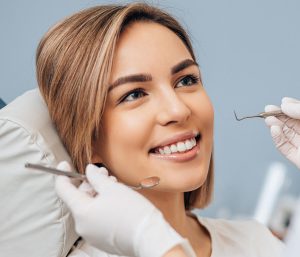El Paso Modern Dentistry in far West Texas is the right place for relief from jaw pain, radiating facial, shoulder, and neck pain, tension headaches, earaches, and migraines. These types of pain are associated with Temporomandibular Joint Disorders (TMDs or TMJDs). This class of conditions may be accompanied by other characteristic symptoms, including:
- “Noisy” jaw, clicks or pops when opening and closing the mouth
- Ringing of the ears (“tinnitus”)
- Jaw stiffness
- Dizziness
Relief may include medications, or alternate therapies and recommendations may reduce patients’ reliance on pain relievers.
TMJ troubles
The Temporomandibular Joints are present on both sides of your face. They connect the jaw to the skull and function as sliding hinges. When they are healthy and not affected by injury, disease, or other disorders, TMJs support many comfortable, efficient, and healthy behaviors – from biting food to speaking clearly and without pain.
When TMJ function is compromised, the multitude of basic behaviors that we take for granted is affected. Discomfort arises when attempting to speak or otherwise “use” your jaw, and the movements that facilitate our basic needs (eating, for instance) become limited or painful.
Dr. Enrique Darancou is trained in, and experienced with, oral anatomical functions. As such, he makes informed decisions about the root cause of your jaw pain and referred pain rooted in the jaw joints. From there, with accurate diagnostics in hand, Dr. Darancou then recommends tailored modifications, medications, exercises, and/or other therapies to effectively and quickly resolve symptoms and to provide lasting relief and enhanced mobility. Additionally, our practice lives up to its “Modern Dentistry” name with advanced imaging that provides clear and detailed insights into oral anatomy. These technologies support accurate diagnoses and complement treatment.
One-of-a-kind treatment plans for one-of-a-kind patients
There is still much that we do not understand fully about TMJDs; however, it is largely thought that dysfunction arises when the “shock absorbers” or discs that separate bones in the joint are forced out of alignment. Likewise, the cartilage covering these bones (or the joints themselves) may become damaged. These processes disrupt how the bones in the joint interact with each other. When they operate as a “well-oiled” machine, and as intended, smooth and comfortable movements are facilitated.
It’s also thought that emotions such as stress and anxiety may make existing TMJD symptoms worse because they cause the interconnected muscles to tighten. And any time this system of tissues becomes stressed, it is a breeding ground for TMJ troubles.
[call]
Real pain relief
Surgical interventions for TMJDs are a “last resort” as it is risky and invasive interventions are only recommended in particularly severe, chronic cases of TMD that have not been resolved through other means. Comparatively conservative options include:
- Medications – NSAIDs, corticosteroids, muscle relaxants, and other drugs may be recommended to relieve jaw and muscular pain and inflammation and to ease overly tight and overactive facial muscles.
- Oral appliances – Devices may be customized to restore proper alignment or “bite,” which can stress TMJs. Other appliances include oral splints or night guards. These lightweight devices are designed to soften the blow sustained by the teeth and jaws during chronic teeth grinding, and they prevent the back teeth from touching when biting down among bruxers. Such repositioning eases the pressure placed on the jaws that leads to an aching face, head, ears, shoulders, or neck.
- Stress management – We may encourage relaxation techniques. By intentionally slowing your breathing, tense muscles are relaxed, and pain relief is promoted.
- Targeted exercises – Physical therapy involves stretching and strengthening the muscles in the jaw. Depending on what we find during an evaluation, we may also recommend massage techniques.
Sometimes, modifications as seemingly simple as refraining from chewing gum or eating chewy foods can diminish the severity and frequency of TMJ pain. Relief is right around the corner! Contact El Paso Modern Dentistry today at [phone] to schedule your evaluation with Dr. Darancou. For your convenience, you may also book a consultation at the “Request an Appointment” button featured on this website.

